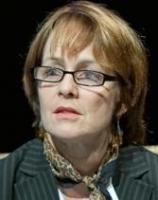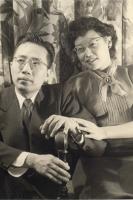August 15, 2012
Edited by David Sanders
Specimen Days
August 15, 2012
1432 – Luigi Pulci, Italy, poet (Morgante), is born.
1615 – Cornelis C Vrancx, Flemish poet/writer (Comfort of Soles), dies.
1729 – Benjamin Neukirch, German poet (Herrn von Hofmannswaldau), dies at 64.
1740 – Matthias Claudius, German poet (d. 1815), is born.
1771 – Walter Scott, Scotland, novelist/poet (Lady of Lake), is born.
1799 – Giuseppe Parini, Italian poet (b. 1729), dies.
1898 – Jan Brzechwa, Polish poet (d. 1966), is born.
1954 – Mary Jo Salter, American poet, is born.
 Why count syllables
Why count syllables
When half the world is hungry?
You had no answer,
Planted another sea-grape
In bright rows, ornamental.
—from “Tanker” by Mary Jo Salter
Poetry In The News
London 2012: Poet-in-Residence Links Worlds of Sport and Art
 Priscila Uppal is the poet-in-residence for Canadian Athletes Now, a role she’s reprising from the Vancouver Winter Games. Every day, while athletes test their endurance on the field or in the pool, Uppal is flexing her literary muscle, penning two poems inspired by the day’s events. Read more at The Star.
Priscila Uppal is the poet-in-residence for Canadian Athletes Now, a role she’s reprising from the Vancouver Winter Games. Every day, while athletes test their endurance on the field or in the pool, Uppal is flexing her literary muscle, penning two poems inspired by the day’s events. Read more at The Star.
Leonard Cohen’s Problematic Poems
Maclean’s, in a short review back in 2006, called Leonard Cohen’s Book of Longing, a collection of poetry and drawings, “open-heart poetry” and a “candid memoir of love, sadness, rage and wry resignation.” Ellen Pao, a junior partner with Kleiner Perkins Caufield & Byers, the Silicon Valley venture firm whose milestone investments include early bets on Amazon and Google, calls Cohen’s book something else: grist in a much-watched sexual discrimination suit she has filed against Kleiner that describes the firm as a hotbed of locker-room-style cronyism and inappropriate flirtations. This, in the environs of Silicon Valley, is juicy, juicy news. Read more at Maclean’s.
World Poetry
26 Hebrew Wordsmiths Added to Israel’s National Curriculum in Bid to Revive Poetry
A gorsedd circle could be set up in an East European country to strengthen links with the National Eisteddfod.The unlikely link between Wales and Hungary is being highlighted at the festival in the Vale of Glamorgan this week. At the weekend the Eisteddfod Choir performed the British Premier of Karl Jenkins’ new work “The Bards of Wales” with soloists Dennis O’Neill and Rebecca Evans. The piece, which was premiered in Hungary in June 2011, forges an unexpected link between the two countries. Read more at Wales Online.
New Books
To Keep Love Blurry by Craig Morgan Teicher
 [Paperback] BOA Editions Ltd., 110 pp., $16.00
[Paperback] BOA Editions Ltd., 110 pp., $16.00
To Keep Love Blurry is about the charged and troubled spaces between intimately connected people: husbands and wives, parents and children, writers and readers. These poems include sonnets, villanelles, and long poems, as well as two poetic prose pieces, tracing how a son becomes a husband and then a father. Robert Lowell is a constant figure throughout the book, which borrows its four-part structure from that poet’s seminal Life Studies.
Gin & Bleach by Catherine Wing
[Paperback] Sarabande Books, 64 pp., $14.95
Gin and bleach: two clear liquids aiming for purity, bordering the toxic. Catherine Wing’s poems are soaked in her cocktail, mixing doubt, loneliness, rough elbows, and razor focus. It riddles, aiming askew for a straight answer: How do we make our way through this world?
What Light Can Do: Essays on Art, Imagination, and the Natural World by Robert Hass
 [Hardcover] Ecco, 496 pp., $29.99
[Hardcover] Ecco, 496 pp., $29.99
An evocative and captivating collection of essays on writers, place, poetry, and photography—with accompanying photos throughout—from Pulitzer Prize and National Book Award winner Robert Hass. A perceptive and evocative mixture of memory, philosophical interrogation, and criticism, the essays in What Light Can Do, finely attuned to the pleasures and pains of being human, are always grounded in the beauty of the material world and its details, and in the larger political and social realities we inhabit.
Until Everything Is Continuous Again: American Poets on Recent Work of W. S. Merwin edited by Jonathan Weinert and Kevin Prufer
[Paperback] WordFarm, 210 pp., $28.00
In this volume, for the first time, fifteen poets and critics gather to discuss the last quarter century of his work, beginning with The Rain in the Trees, a collection of poems that marks a turning point in Merwin’s career. At times personal and at times scholarly, these essays place the poet’s recent work in the context of a lifetime of writing, and help us to understand how this seminal literary figure fits into the ongoing conversation of American poetry.
Recent Reviews
The Prayers of a Poet
by Micah Mattix
It’s fair to say that the German poet Rainer Maria Rilke was bedeviled by God, or what the poet called God. In “Improvisations of the Caprisian Winter” (1906-07), God is a mountain, Rilke writes, in which “I climb / and descend all alone and lose the way.” In another early, uncollected poem (1909), he addresses God as “you, whom I cannot take hold of now, anywhere.” Read more at the Wall Street Journal.
Amen
Ariana Reines’s Erotic Soul
by B.K. Fischer
The erotic sublime is a species of paradox in English-language poetry. Trafficking in the sublime usually entails a renunciation of the body, a giving-over of style, beauty, and politics, to the ineffable at the expense of the real—all of which coexist uneasily with the demands of human contact associated with the erotic. And yet Ariana Reines, perhaps the most sexually explicit poet writing today, flirts with sublimity, transcendent desire, and mysticism. Read more at the Boston Review.
Patrick Dunagan on Basil Bunting
by Patrick Dunagan
Basil Bunting often goes unacknowledged as a major contributing innovator of Modern poetry in English. Rather unfortunately — as Bunting had no love of Academics — the lapse in knowledge of his work appears more prevalent among younger practicing poets than among scholars. His meticulously chiseled verse excels and pushes the Pound-Eliot line of Modernism beyond established confines. His work broadens our attention to the sounds of language in poetry through the concise palette of his rarefied workman’s ear. Read more at Critical Flame.
A Season in Hell
Mary Jo Bang’s new “translation” of Dante’s “Inferno” backfires in trying to make a classic poem cool.
by Arlice Davenport
Inside the magnificently decorated 14th-century Gothic Cathedral in Orvieto, Italy, sits a chapel full of floor-to-ceiling frescoes, depicting the Last Judgment. The painter is Luco Signorelli, who portrays himself at the Apocalypse, staring back at us, as if to say: Do you understand the meaning of my masterpiece, that I am painting your destiny here, among the damned and the saved? Read more at the Wichita Eagle.
Correspondences
Mary Jo Bang
 by Zachary Lazar
by Zachary Lazar
Mary Jo Bang’s new translation of Dante’s “Inferno” restores meaning to that old book-blurb cliché, “startlingly original.” I say this because I have tried and failed several times to describe the book to friends. Imagine a contemporary translation of Dante that includes references to Pink Floyd, South Park, Donald Rumsfeld, and Star Trek. Now imagine that this isn’t gimmicky—this is the hardest but most important part to imagine. Imagine instead that the old warhorse is now scary again, and perversely funny, and lyrical and faux-lyrical in a way that sounds sometimes like Auden, sometimes like Nabokov, but always like Mary Jo Bang. Read more at BOMB.
Sunset on the Green
Interview with translator of H.E. Sayeh’s poetry
by Maryam Raeesdana
Chad Sweeney teaches in the MFA program at California State University, San Bernardino and lives in Redlands. He is the author of four books of poetry: Wolf’s Milk: Lost Notebooks of Juan Sweeney (Forklift Books, 2012); Parable of Hide and Seek (Alice James, 2010); Arranging the Blaze (Anhinga); and An Architecture (BlazeVOX); and he is co-translator of the Selected Poems of contemporary Iranian poet H.E. Sayeh (White Pine). He is coeditor of Parthenon West Review, a journal of contemporary poetry and translation. Sweeney’s poems have been included in Best American Poetry, The Pushcart Prize Anthology and The Writer’s Almanac. Read more at the Iranian.
Broadsides
A Poet From China’s Avant-Garde Looks Back
 By Debra Bruno
By Debra Bruno
The Chinese poets grouped together as the “Nine Leaves” school were once considered the country’s most avant-garde, a marked contrast to the propagandistic writing that became common during Mao’s reign. Nine Leaves’ last living member, Zheng Min, stopped writing along with the other poets in the 1950s after she returned from a sojourn in the U.S. to study literature at Brown University and voice at Juilliard. She picked the pen back up in 1979, a period she calls her “second childhood,” when she began to explore poetry as well as philosophy and translation. Read more at the Wall Street Journal.
Drafts & Fragments
From A Poet Reflects
 From A Poet Reflects
From A Poet Reflects
“It is difficult to imagine the degree to which people lived then in the shadow of poetry. It was a frenzied passion, another way of being, a fireball that went everywhere on its own. We would open the paper, even the business section or the legal page, or we would read the coffee grounds at the bottom of the cup, and there was poetry waiting to take over our dreams.”
—Gabriel García Márquez, from Living to Tell the Tale, translated from the Spanish by Edith Grossman
Envoi: Editor’s Notes
Poetry That Will Get You Through a Hard Time
 by David Rakoff
by David Rakoff
I have been using Elizabeth Bishop’s “Letter to N.Y.” for the last few years just as reliantly and regularly as I take aspirin for headaches. Every few weeks or so, I have an MRI to check on a tumor that has tenaciously nestled itself behind my collarbone. The hope of each scan is that the chemotherapy I’m regularly receiving is working and the mass is getting smaller and my brilliant surgeon will soon be able to work her magic without having to amputate my left arm. Read more at Oprah.com.
The essayist and humorist David Rakoff died a week ago. Last year, he and four other writers were invited to contribute to an article about the poems that they turn to in hard times. Despite the fact or maybe because of the fact that Rakoff was enduring painful medical attention for a terminal condition, the poem he chose (“Letter to N.Y.”) is one of lightness and other-directedness. It is also a tender plea offered in a flat, unsentimental voice that Bishop’s poems often project. It strikes me not only as a tender and unsentimental choice that Rakoff made, but also apt in its close attention to the mundane: documentation worth carrying around in your head and holding onto. It’s also interesting that he mentions “the busywork of recitation.” Pulling the poem up from memory and thus distracting himself from his situation is akin, I think, to the process of writing a poem in form. The “busywork” of the form distracts the poet from the subject matter long enough for unforced thoughts to rise to the surface and move the poem in unanticipated directions. Look at “Letter to N.Y.” and see how the rhyme takes the poem, line by line, places unforeseen but which, in retrospect, seem perfectly reasonable. As Rakoff says, from that distraction “come the barely-seen flashes of meaning.”
—David Sanders